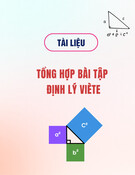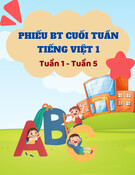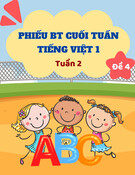
Đ C NG ÔN T P H C KÌ IIỀ ƯƠ Ậ Ọ
MÔN TI NG ANH 9Ế
Unit 6: THE ENVIRONMENT
I. Adjectives and Adverbs (Tính t và Tr ng T )ừ ạ ừ
a.Adjective:
- Tính t đng tr c m t danh t đ b nghĩa cho danh t đó.ừ ứ ướ ộ ừ ể ổ ừ
Ex: It is a white shirt.
- Tính t theo sau m t s đng t nh : to be, seem, keep, look, feel, taste, ừ ộ ố ộ ừ ư
sound, smell, get, become …
Ex: She is intelligent.
b. Adverb:
CÁCH THÀNH L P TR NG T CH TH CÁCH:Ậ Ạ Ừ Ỉ Ể
Tính t + ly ừ → Tr ng tạ ừ
- bad + ly → badly
- slow + ly = slowly
- happy + ly → happily
M t s tr ng h p ngo i l :ộ ố ườ ợ ạ ệ
- good → well , - early → early
- late → late , - hard → hard , - fast → fast
Ex: He is a good student. He studies well.
Tr ng tạ ừ có ch c năng b nghĩa cho ứ ổ đng t th ngộ ừ ườ .
II. ADVERB CLAUSES OF REASON: Các m nh đ tr ng ng ch lý doệ ề ạ ữ ỉ
M nh đ tr ng ng ch lý do b t đu b ng: Because / Since / As nói lên lý doệ ề ạ ữ ỉ ắ ầ ằ
c a s vi c đc th hi n qua m nh đ chính.ủ ự ệ ượ ể ệ ệ ề
Ex: Ba is tired because / since / as he stayed up late watching TV.
III. ADJECTIVE + THAT CLAUSE
Trong đó “that-clause” b sung nghĩa cho adjective; mang nghĩa ổ“r ng, là, mà”ằ.
S + to be + Adjective + That + S + V
Ex: That’s wonderful. I am pleased that you are working hard.
IV. CONDITIONAL SENTENCES TYPE 1 (Câu đi u ki n lo i 1)ề ệ ạ
Nói đn m t kh năng có th x y ra, thành hi n th c trong t ng lai.ế ộ ả ể ả ệ ự ươ
Câu đi u ki n thông th ng ề ệ ườ có 2 ph n:ầ
- Ph n nêu lên đi u ki n b t đu v i IF ta g i là m nh đ ch đi u ki n (If ầ ề ệ ắ ầ ớ ọ ệ ề ỉ ề ệ
Clause). N u ếm nh đ ifệ ề vi t tr c thì ph i có d u ph y.ế ướ ả ấ ả
- Ph n nêu lên k t qu g i là m nh đ chính. (Main Clause)ầ ế ả ọ ệ ề
IF CLAUSE MAIN CLAUSE
1

Verb in Simple Present (Hi n T i ệ ạ
Đn)ơ
If - S – V (s/es)- O
Verb in Simple Future (T ng lai ươ
đn)ơ
S – will – V (bare infinitive) - O
Ex: If we pollute the water, we will have no fresh water to use.
Practice
1: Circle the correct word
a. You shouldn't eat quick/ quickly. It's not good for your health.
b. Could we have some quick/ quickly words with you?
c. Hoa is studying hard/ hardly for her exams.
d. Nam answered very soft/ softly but everyone could hear him clear/ clearly.
e. Hurry up, Ba. You are always so slow/ slowly.
f. All the classrooms were bad/ badly painted.
g. We feel very happy/ happily today.
h. Liz talked very interesting/ interestingly about her working day.
2. Complete the passage with the words given in the box
important sudden careful good far new
stupid past early rapid fast
quick hurried cheap full beautiful
Last week I had an important interview for a job. I got up ............(1) and
dressed ............(2). I put on my ............(3) jacket and trousers. I had to travel by train,
so I walked to the station. It isn't ............(4) from my house. I was walking
quite ............(5) when I saw a man just ahead painting his fence with red paint. He
didn't notice me as I walked ............(6). Then he turned ............(7) and splashed
my ............(8) trousers! He had acted ............(9) and he apologized, but the damage
was done.
There was a big store on the corner, so I decided to buy a new pair ............(10).
I ............(11) found a nice pair, and it was quite ............(12). The shop was ............
(13), so I paid ............(14), grabbed my shopping - bag and left. On the train, I went to
the toilet to change. I took off my stained trousers and threw them out of the window.
Then I opened the bag to get my ............(15) ones, But all I found was a pink woolen
sweater!
3. Answer the questions
a. How do you usually feel before an exam?
b. How do you usually walk when you are tired?
c. How do you feel when you have a good news?
d. How do you usually study before an exam?
2

e. How do you usually sing in a class meeting?
f. How do you usually play in a sports game?
g. What is your English like?
4. Combine the sentences. Use “because, since, as.’
a. The water is highly polluted. We can not swim in this part of the river.
b. The company does not produce recycled paper. It is more expensive to produce
than regular paper.
c. We want people to be aware of the problem of pollution. We have "a green week"
three times a year.
d. The area around the beach is full of trash. Noone wants to go swimming or
sunbathing there.
e. It started to rain. We could not keep on cleaning the beach.
f. Mr. Minh is admired. He dedicated all his life to protecting environment.
5. Matching
a. It's
annoying ...
F. that tourists pollute the areas around the
national resorts.
b. He is aware ... A. that he has to work harder from now on.
c. I am
conscious ...
D. that I have to follow the school regulations.
d. We are worried
...
G. that people don't stop throwing trash along
the streets.
e. We are
confident ...
B. that we will be able to persuade our friends
to keep the school clean.
f. Everyone was
sad ...
E. that she had to return to America.
g. I'm glad ... C. that you are feeling better.
6 Use “That” to combine these sentences
a. No one stopped those people cutting down the trees. I was surprised.
b. The oil will pollute the sea. People are worried.
c. My team has won the first award of the competition. I am proud.
d. They can help us clean up the beach. They are certain.
e. You could recover very quickly. I am very happy.
f. They did not tell us how to do it. I am disappointed.
7. Write full sestences with conditional sentences .
a. She comes late again D. she will lose her job
3

b. I win this competition F. I will give the award to the
unlucky people
c. We go by train B. it will be cheaper
d. We go by plane E. it will be quicker
e. You need more bags A. I'll give you some
f. We throw these bottles over
the hedge
C. that will pollute the wood
8. Answer the questions
a. What will you do if you don't see me tomorrow? (call up)
b. What will we do if the weather is good tomorrow? (go swimming)
c. What will he do if he doesn't win the competition? (resign the Captain title)
d. What will we do if the streets are full of trash? (heap it and burn it down)
e. What will they do if we don't lend them our tools? (Work with their hand)
f. What will she do if it rains? (stay at home and watch TV)
9. Write full sestences with conditional sentences .
a. If we (keep on) using more and more motor vehicles, we (run out) of oil.
b. If we (run out) of oil, we (need) other kind of energy.
c. If we (use) more oil and coal, pollution (increase).
d. If pollution (increase), more and more trees (die).
e. If more and more trees (die), the climate (change).
f. If the climate (change), we (meet) with natural disasters.
g. If we (try) to control pollution, it (be) very expensive.
h. But if we (not control) pollution, it (be) too late.
UNIT 7: SAVING ENERGY
I. Connectives (các t n iừ ố ): and, but, because, or, so, therefore, however
- Có ch c năng n i các t , các m nh đ, các câu ứ ố ừ ệ ề l i ạv i nhau.ớ
Ex: I’d love to play volleyball but I have to complete an assignment.
II. Phrasal verbs (Các ng đng t )ữ ộ ừ
- turn off (t t), turn on (m , b t), look for (tìm, ki m), look after (trông nom, ắ ở ậ ế
chăm sóc), go on (ti p t c)ế ụ ...
III. Making Suggestions (Đa ra l i đ ngh )ư ờ ề ị
1. SUGGEST + V-ING:
Ex: I suggest collecting some money.
2. SUGGEST + (that) + S + should +V:
Ex: I suggest (that) you should speak English in class.
*Practice
I. Choose the word or phrase that best completes each of the following sentences.
4

1.What about...............by bike to school.
A. go B.going C. went D. is going
2.Let’s .........check crack in the pipes.
A. checking B. check C. checks D. is checking
3. My mother visited Sam Son ........ Halong last summer.
A. or B. and C. but D. however
4. It is raining....... I can’t go to the beach.
A. so B. because C. but D however
5. Lan fail the exam....... she didn’t study hard.
A. or B. and C. because D. however
6. They ________ Nam last summer.
A. met B. will meet C. are meeting D. meet
7. We ________here since 2001.
A. worked B. work C. have work D. worked
8. She always________ to the library to read borrow books.
A. go B. is going C. goes D. went
9. I can’t understand the French visitors. I wish I _______ French.
A. know B. have known C. knew D. will know
10. She always ..... me on Sunday.
A. calls B.calling C. called D. to call
11. We......the examination tomorrow.
A. do B. shall do C. did D. doing
12. Mr. Long said that he _______ in Ho Chi Minh City.
A. is living B. has lived C. lived D. will live
13. ________ I was really tired, I couldn’t sleep.
A. Therefore B. Because C. Even though D. So
14. She felt tired ________, she had to finish her homework.
A. However B. Therefore C. So D. Although
15. Would you like coffee ........ beer?
A. However B. Therefore C. So D. or
II. Complete the sentences.
turn on turn off go on look for look after
1. Please................................the T.V. I want to watch the weather forecast.
2. I must ................................... my younger sister because my mother is out today.
3. He has lost his pen so he is ...................................... it.
4. If we ............................. wasting water, there will be a shortage of fresh water
5. You should ..................................... all the bulbs before going out.
5



![Tài liệu tham khảo Tiếng Anh lớp 8 [mới nhất/hay nhất/chuẩn nhất]](https://cdn.tailieu.vn/images/document/thumbnail/2025/20250806/anhvan.knndl.htc@gmail.com/135x160/54311754535084.jpg)










![Phiếu bài tập cuối tuần Tiếng Việt 1 tuần 2 đề 2: [Hướng dẫn chi tiết]](https://cdn.tailieu.vn/images/document/thumbnail/2025/20250728/thanhha01/135x160/42951755577464.jpg)

